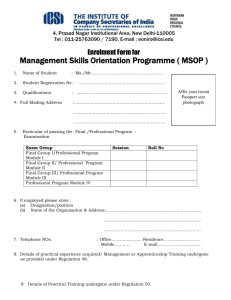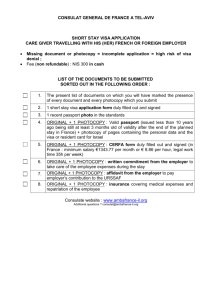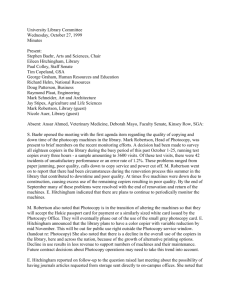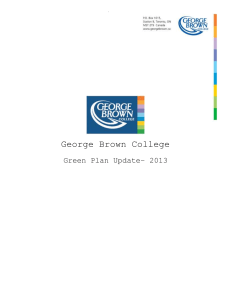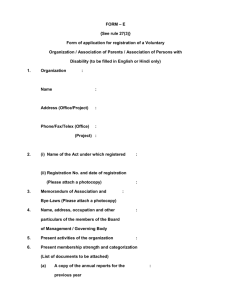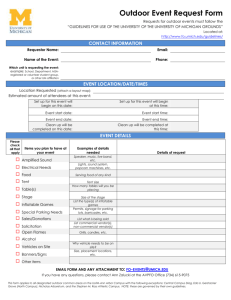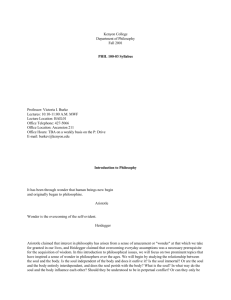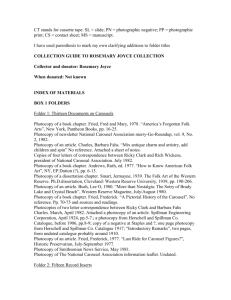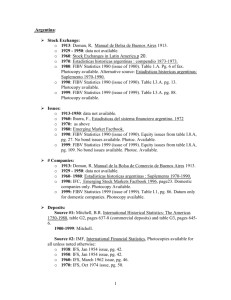Green Plan Policies and Practices
advertisement
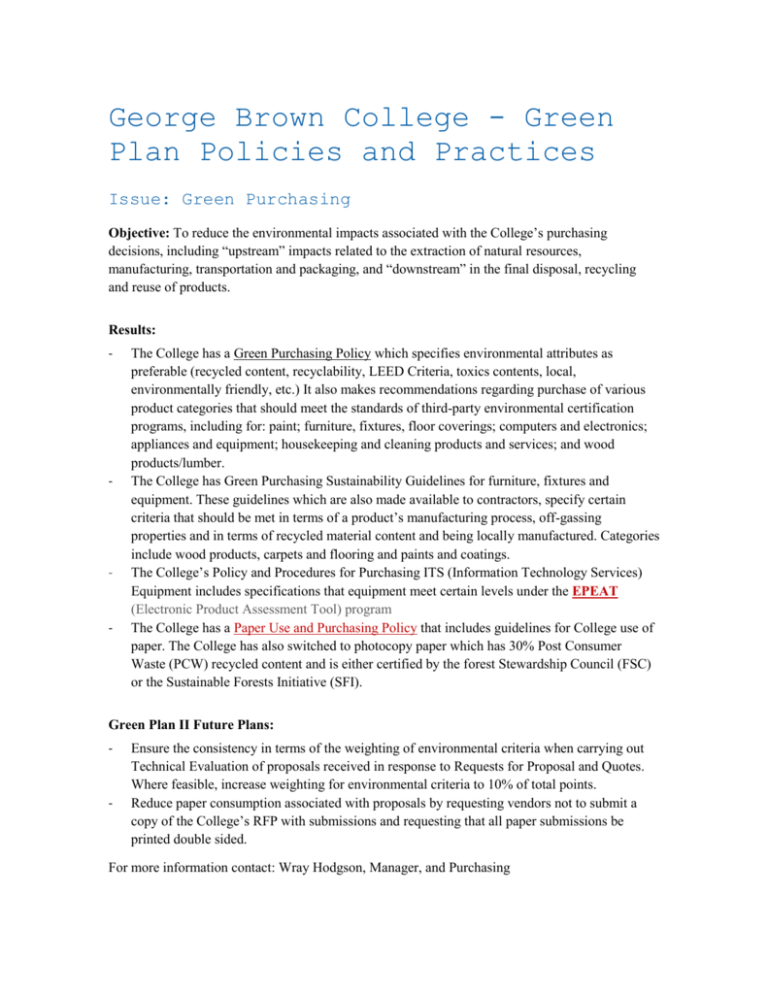
George Brown College - Green Plan Policies and Practices Issue: Green Purchasing Objective: To reduce the environmental impacts associated with the College’s purchasing decisions, including “upstream” impacts related to the extraction of natural resources, manufacturing, transportation and packaging, and “downstream” in the final disposal, recycling and reuse of products. Results: - - - - The College has a Green Purchasing Policy which specifies environmental attributes as preferable (recycled content, recyclability, LEED Criteria, toxics contents, local, environmentally friendly, etc.) It also makes recommendations regarding purchase of various product categories that should meet the standards of third-party environmental certification programs, including for: paint; furniture, fixtures, floor coverings; computers and electronics; appliances and equipment; housekeeping and cleaning products and services; and wood products/lumber. The College has Green Purchasing Sustainability Guidelines for furniture, fixtures and equipment. These guidelines which are also made available to contractors, specify certain criteria that should be met in terms of a product’s manufacturing process, off-gassing properties and in terms of recycled material content and being locally manufactured. Categories include wood products, carpets and flooring and paints and coatings. The College’s Policy and Procedures for Purchasing ITS (Information Technology Services) Equipment includes specifications that equipment meet certain levels under the EPEAT (Electronic Product Assessment Tool) program The College has a Paper Use and Purchasing Policy that includes guidelines for College use of paper. The College has also switched to photocopy paper which has 30% Post Consumer Waste (PCW) recycled content and is either certified by the forest Stewardship Council (FSC) or the Sustainable Forests Initiative (SFI). Green Plan II Future Plans: - - Ensure the consistency in terms of the weighting of environmental criteria when carrying out Technical Evaluation of proposals received in response to Requests for Proposal and Quotes. Where feasible, increase weighting for environmental criteria to 10% of total points. Reduce paper consumption associated with proposals by requesting vendors not to submit a copy of the College’s RFP with submissions and requesting that all paper submissions be printed double sided. For more information contact: Wray Hodgson, Manager, and Purchasing Issue: Paper Consumption Green Plan I Goal: To reduce total consumption of paper by 15% over 5 years and to purchase paper that has been manufactured with minimal impact on the environment. Progress to Date: - Over the last four years the College’s photocopy paper has increased by 10.2%; however, per capita paper use has decreased by approximately the same amount. Photocopy Paper Per Capita GBC Photocopy Paper Per Capita (GBC Photocopy per Capita & Grenville) Sheets Grenville GBC Photocopy # Sheets Grenville Printing # Sheets Total # Sheets 2009-10: 17,977,000 9,827,612 27,804,612 1,159 749 409 2010-11 21,277,838 11,280,772 32,558,610 1,163 760 403 2011-12 21,679,241 10,617,675 32,296,916 1,114 774 379 2012-13 19,971,392 10,667,347 30,638,739 1,057 689 368 10.19% Green Plan II Future Plans: - Launch a Photocopy Paper Challenge to all departments to reduce paper use by 15%. Be more proactive in encouraging faculty to provide course outlines on-line and to accept and mark assignments electronically. Consider adding a surcharge to departments for paper use to serve as an incentive to reduce paper consumption. Start tracking student paper consumption such as in the Learning Commons and Computer Labs and other classroom with printers New campus locations at Waterfront Campus, 193 and 341 King do not allow single (personal) printers. For more information contact: Geoff Swift, Senior Manager, Business Services Issue: Greening Food Services Green Plan Objective: To reduce the environmental impacts of the College’s food service operation by modeling environmental sustainability practices. Green Plan I Results: - The College developed a Green Meeting Guide that is used as a resource by the College community in planning events and functions with minimal impact on the environment. -10.17% - Only Fair Trade certified (organic and shade-grown) coffee is used in College-run cafeterias and for catering. Customers are offered 10 cent discount for bringing their own reusable coffee/tea mug to the cafeteria. The use of Styrofoam in College food services has been eliminated; take out containers in College run cafeterias are biodegradable as are all coffee cups. The College no longer uses bottled water for office catering; bulk water is provided instead. New vending machines with healthier food options have been added to St. James campus as a pilot. We switched to single serve Pizza Pizza servings instead of a whole mini-pizza box reducing cardboard use. Used vegetable oil is collected and sent to a local chicken farm where it is used as a feed additive. All pre-consumer food waste is collected for compost including from Tim Horton's/ Condiments are served in bulk rather than single serve packages. All napkins are 100% recycled, unbleached napkins. Green Plan II Future Plans: - - Be a resource to the Student Association in helping them to specify environmentally friendly food service options for their food service vendors such as at La Doice Vita. For example, an effort needs to be made to eliminate use of Styrofoam take-out containers. Start with the Waterfront Campus, efforts will be made to track purchase of local (Ontario) food and percentage of "sustainable" food. For more information contact: Geoff Swift, Senior Manager, Finance Issue: Transportation Green Plan I Objective: - Encourage alternatives to conventional vehicle use. Progress to Date: - The College has added over 40 new bike parking spots on Casa Loma and St. James Campuses. The College provides incentives for public transit by providing discounted TTC Metropasses for students and employee as well as a College discount for Auto Share membership. College is working with Smart Commute Toronto to develop an overall Sustainable Transportation Strategy. Green Plan II Future Plans - Set-up an on-line Smart Commute Car Pool Zone for College employees. Investigate possibility of putting shelters over some of the bike parking racks. Explore feasibility of designated carpool parking for carpoolers. - Make special parking spots available at Casa Loma Campus for hybrid vehicles and car pool cars. Encourage employees to take advantage of the City's Activate Your Commute web-site and resources. For more information: Contact Stephanie Foster, Green Team/ Sustainability Coordinator
